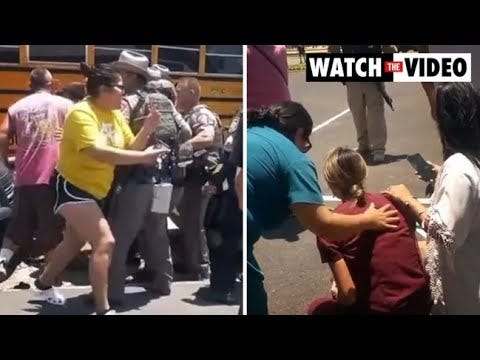All over America this week, people are shocked and horrified by the mass killing of children at an elementary school in Uvalde, Texas. The horror plays out in images that can’t be set aside:
A small army of police from local, state, and federal agencies, many wearing body armor and armed with long guns, responding to the ongoing mass murder of children by forming a perimeter around the school and tackling parents to keep them from entering the campus where their children were dying and no one was doing anything to stop the killing.
Young children, locked inside a classroom with their dead friends and the man-child who had killed them, calling 911 to beg for help while police waited outside in a hallway — until the calls stopped, and children who were alive more than a half-hour into the attack had died, waiting for police who didn’t come.
The rage and the disgust that these that these images cause, layered over the horror for the children and the terror they experienced in the last minutes of their lives, force us to examine the quality of our institutions. What do we do about police who won’t help, and who specifically won’t help children who are threatened with violent death? What do we do with the information that the Border Patrol tactical team that finally entered the classroom and killed the attacker had to disobey orders to do it, acting as individuals rather than a coordinated part of a giant and expensive bureaucracy that exists for the declared purpose of protecting the community?
Fortunately, we have a model for dealing with these incredibly dark questions about protective institutions that turn out to be useless or even counterproductive, an active impediment to their declared purposes. We have the public health model.
It’s the Fauci-Jankowicz pivot: We stop thinking about the police response, and we start getting control over the discussion about the police response. Clearly what we need is a government committee that has the authority to intervene in the public narrative in the wake of a school shooting. The Committee on Offending Police after Shootings (COPS), to be run by a trained disinformation expert who can sing like Mary Poppins, must have the authority to declare that the police did not wait outside the school without engaging the shooter. It should have the power to tamp down the disinformation that police tackled and handcuffed horrified parents who were trying to help their children. Like saying that it’s disinformation to claim that mRNA vaccines don’t stop transmission of, or infection with, Covid-19, a government committee on school shootings can restore faith in our institutions by declaratively negating anyone who notices that police failed to protect children. There will, obviously, be Twitter bans. Parents in Uvalde, meet Alex Berenson.
More powerfully, if school shooting prevention were to be made an academic discipline, authorities could use the science of school shootings to limit questions and criticism. Why did police fail to move toward the attacker for over an hour, even though their training on active shooters on campuses explicitly required that exact response?


Watch this: “The science has changed.” Boom!
And just like that, the problem is solved. Or, rather, the problem isn’t solved, but the problem of having the problem is solved, because government officials have the authority and status to say that people who talk about the problem are spreading disinformation, so the problem, because they say so, is no longer the problem.
Also, something about Putin.
This implosion of faith and trust, this darkness rising like bile until you feel like you can choke on it, this sense that we’re embedded in a tangle of institutions that don’t work and can’t help: It has to be addressed. And great leaders in the public health field have already showed us a way to address all of those problems:
We have to say that they don’t exist.
Stop spreading disinformation!
Now go report somebody on Facebook for saying that the police failed. We can beat this thing.






We are dying from within. I told my husband 10+ years ago that we were finished without an EMP or something to take down the internet. The internet, for all its good, is poison. Sadly, we are producing shocking numbers of self important, self involved, sociopathic narcissists instead of fully formed souls.
you have to wonder if the past year or so of the Defund the Police crowd has affected and demoralized them. why should they bother? they'll be demonized no matter what they do. if they had gone in and "neutralized" the shooter, would they be accused of "anti-Latinx" racism?
then again, this kind of cowardice seems all too common- we're going to vaccinate children and subject them to the harms of the vaccine for a disease that has no affect on them to make old people and teacher's unions "feel" safe. doctors are going to do what they are told, rather than what they know to be right for their patients to protect their careers over those patients. hospitals put covid sufferers on ventilators, not because it helped the sick, but because it protected the medical staff from their infected exhalations.
for a magnificent angry essay on this subject, read Vinay Prasad's substack called Duty (https://vinayprasadmdmph.substack.com/p/duty?s=r). here's a pretty conventional oncologist/hematologist who is so disgusted by what he's seen in his profession that he's becoming radicalized. when you read this, you can't stop thinking about those police who didn't take the risks that are part of their job, who didn't do their duty.